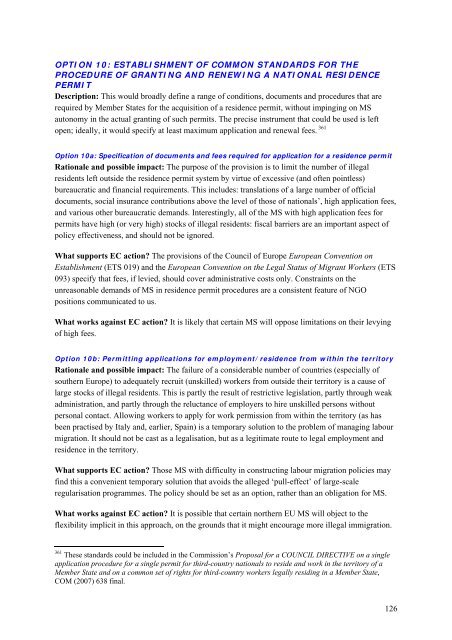REGINE Regularisations in Europe Final Report - European ...
REGINE Regularisations in Europe Final Report - European ...
REGINE Regularisations in Europe Final Report - European ...
Create successful ePaper yourself
Turn your PDF publications into a flip-book with our unique Google optimized e-Paper software.
OPTION 10: ESTABLISHMENT OF COMMON STANDARDS FOR THE<br />
PROCEDURE OF GRANTING AND RENEWING A NATIONAL RESIDENCE<br />
PERMIT<br />
Description: This would broadly def<strong>in</strong>e a range of conditions, documents and procedures that are<br />
required by Member States for the acquisition of a residence permit, without imp<strong>in</strong>g<strong>in</strong>g on MS<br />
autonomy <strong>in</strong> the actual grant<strong>in</strong>g of such permits. The precise <strong>in</strong>strument that could be used is left<br />
open; ideally, it would specify at least maximum application and renewal fees. 361<br />
Option 10a: Specification of documents and fees required for application for a residence permit<br />
Rationale and possible impact: The purpose of the provision is to limit the number of illegal<br />
residents left outside the residence permit system by virtue of excessive (and often po<strong>in</strong>tless)<br />
bureaucratic and f<strong>in</strong>ancial requirements. This <strong>in</strong>cludes: translations of a large number of official<br />
documents, social <strong>in</strong>surance contributions above the level of those of nationals’, high application fees,<br />
and various other bureaucratic demands. Interest<strong>in</strong>gly, all of the MS with high application fees for<br />
permits have high (or very high) stocks of illegal residents: fiscal barriers are an important aspect of<br />
policy effectiveness, and should not be ignored.<br />
What supports EC action? The provisions of the Council of <strong>Europe</strong> <strong>Europe</strong>an Convention on<br />
Establishment (ETS 019) and the <strong>Europe</strong>an Convention on the Legal Status of Migrant Workers (ETS<br />
093) specify that fees, if levied, should cover adm<strong>in</strong>istrative costs only. Constra<strong>in</strong>ts on the<br />
unreasonable demands of MS <strong>in</strong> residence permit procedures are a consistent feature of NGO<br />
positions communicated to us.<br />
What works aga<strong>in</strong>st EC action? It is likely that certa<strong>in</strong> MS will oppose limitations on their levy<strong>in</strong>g<br />
of high fees.<br />
Option 10b: Permitt<strong>in</strong>g applications for employment/residence from with<strong>in</strong> the territory<br />
Rationale and possible impact: The failure of a considerable number of countries (especially of<br />
southern <strong>Europe</strong>) to adequately recruit (unskilled) workers from outside their territory is a cause of<br />
large stocks of illegal residents. This is partly the result of restrictive legislation, partly through weak<br />
adm<strong>in</strong>istration, and partly through the reluctance of employers to hire unskilled persons without<br />
personal contact. Allow<strong>in</strong>g workers to apply for work permission from with<strong>in</strong> the territory (as has<br />
been practised by Italy and, earlier, Spa<strong>in</strong>) is a temporary solution to the problem of manag<strong>in</strong>g labour<br />
migration. It should not be cast as a legalisation, but as a legitimate route to legal employment and<br />
residence <strong>in</strong> the territory.<br />
What supports EC action? Those MS with difficulty <strong>in</strong> construct<strong>in</strong>g labour migration policies may<br />
f<strong>in</strong>d this a convenient temporary solution that avoids the alleged ‘pull-effect’ of large-scale<br />
regularisation programmes. The policy should be set as an option, rather than an obligation for MS.<br />
What works aga<strong>in</strong>st EC action? It is possible that certa<strong>in</strong> northern EU MS will object to the<br />
flexibility implicit <strong>in</strong> this approach, on the grounds that it might encourage more illegal immigration.<br />
361 These standards could be <strong>in</strong>cluded <strong>in</strong> the Commission’s Proposal for a COUNCIL DIRECTIVE on a s<strong>in</strong>gle<br />
application procedure for a s<strong>in</strong>gle permit for third-country nationals to reside and work <strong>in</strong> the territory of a<br />
Member State and on a common set of rights for third-country workers legally resid<strong>in</strong>g <strong>in</strong> a Member State,<br />
COM (2007) 638 f<strong>in</strong>al.<br />
126
















